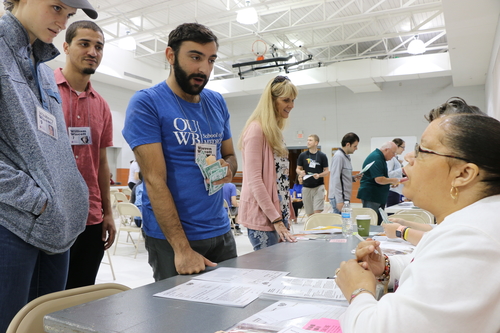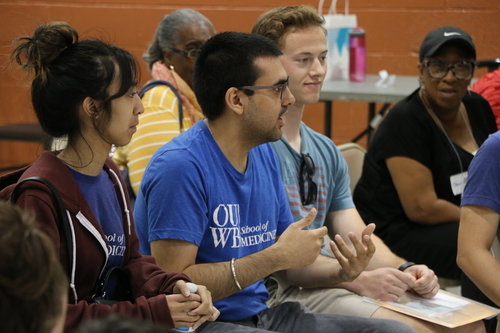
About 30 medical students from Oakland University William Beaumont School of Medicine (OUWB) walked a proverbial mile in the shoes of those less fortunate during a recent poverty simulation.
The Missouri Community Action Network Poverty Simulation (CAPS) was held Aug. 24 at Welcome Missionary Baptist Church in Pontiac, Michigan.
CAPS is an interactive immersion experience designed to sensitize participants to the realities of poverty. Experiences are based on real clients from the Missouri Community Action Network, which licenses the CAPS assets and training it has developed to other organizations.
For OUWB, the program was a pilot and is under consideration as a curriculum requirement.
But the impact was immediate, said Robert Noiva, Ph.D, associate dean of Graduate Studies and Community Integration, and associate professor in the Department of Foundational Medical Studies.
“When students are seeing these people as patients it gives them a better understanding of the challenges of what they may be going through,” Noiva said in a live interview on Detroit’s WWJ-AM. “If someone is coming 10 minutes late for an appointment or is having trouble paying for the prescriptions, the students are understanding that this isn’t an issue of noncompliance — that it may be some of the challenges that they (the patients) are going through in their lives that are making it more difficult for them to follow some of the recommendations that the students will be giving them as a health care provider.”
‘Authentic community environment’
CAPS coincided with OUWB’s annual Day of Service, also held Aug. 24.
The pilot program was conducted with the assistance of COMPASS, the official address of community engagement at OUWB.
COMPASS focuses on navigating connections with local, regional, national and global communities. These relationships enable faculty and staff to share their expertise with the community and assist medical students with meeting their learning objectives while identifying the needs of vulnerable populations who are served by our many diverse COMPASS community partners.
“It was important for us to conduct the simulation in an authentic community environment, in which many of its members have struggled with poverty or low income, and not in a classroom in (OUWB’s) O’Dowd Hall,” said Rose Wedemeyer, Ph.D., director of Education Training.
The poverty simulation is based on materials (compiled into a “kit”) developed by the Missouri Community Action Network — a network of community action agencies throughout Missouri that provide a variety of services to low-income individuals and families. The kit is used by more than 2,000 organizations globally.
Participants role-played the lives of low-income families.
By example, some were recipients of financial aid through Temporary Assistance for Needy Families (TANF), some were disabled, and others were senior citizens on Social Security.
Participants had the stressful task of providing for basic necessities and shelter on a limited budget during the course of four, 15-minute "weeks." They also interacted with agencies, grocers, pawnbrokers, bill collectors, job interviewers, police officers, and others — roles that were filled by volunteer faculty and staff from OUWB, Oakland University School of Education, and OU’s School of Health Sciences, as well as community and church members.
 During an hour-long debriefing session at the end of the simulation, participants were asked to describe how they felt in one word. Words included lost, stressful, frustrating, and emotional, just to name a few.
During an hour-long debriefing session at the end of the simulation, participants were asked to describe how they felt in one word. Words included lost, stressful, frustrating, and emotional, just to name a few.
Community volunteers step up
Pastor Douglas P. Jones, of Welcome Missionary Baptist Church, said he was happy that his church could host the event “to give people a very real sense of what others go through.”
He said volunteers also were excited to be involved.
“There was not one hesitation when it came to stepping up to volunteer,” he said.
Wedemeyer praised Jones for being a “welcoming and gracious collaborator.”
Earl King, a member of the church, was among volunteers from the church. He was assigned the role of “doctor.”
“I’m just trying to help the young people get ready for the real world,” he said. “I think it’s good for them to find out stuff like everything’s not as cheap as they think it is.”
Caress Dean, Ph.D., MPH, an assistant professor in public health at Oakland University’s School of Health Sciences, called the event “a practical opportunity that can be really enriching for the students.”
“It’s an opportunity to go beyond traditional lectures to engage students and help them understand what the real world is like — not only for their patients, but for themselves,” she said.
Victoria Lucia, Ph.D., associate professor, Department of Foundational Medical Studies, said she hoped that’s exactly the kind of thing participants took away from the event.
“It’s an experiential session to help reinforce a lot of the classroom instruction that students have received in their longitudinal courses, like Medical Humanities & Clinical Bioethics, Art and Practice of Medicine, and Promotion and Maintenance of Health,” she said. “Students learn a lot about social determinants of health, and social and structural barriers.”
“The hope is this will help solidify what they’re learning in the classroom,” she added.
For more information, contact Andrew Dietderich, marketing writer, OUWB, at [email protected].

